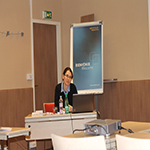Euroacademia Conferences
 Europe Inside-Out: Europe and Europeanness Exposed to Plural Observers (9th Edition) April 24 - 25, 2020
Europe Inside-Out: Europe and Europeanness Exposed to Plural Observers (9th Edition) April 24 - 25, 2020 Identities and Identifications: Politicized Uses of Collective Identities (9th Edition) June 12 - 13, 2020
Identities and Identifications: Politicized Uses of Collective Identities (9th Edition) June 12 - 13, 2020 8th Forum of Critical Studies: Asking Big Questions Again January 24 - 25, 2020
8th Forum of Critical Studies: Asking Big Questions Again January 24 - 25, 2020 Re-Inventing Eastern Europe (7th Edition) December 13 - 14, 2019
Re-Inventing Eastern Europe (7th Edition) December 13 - 14, 2019 The European Union and the Politicization of Europe (8th Edition) October 25 - 26, 2019
The European Union and the Politicization of Europe (8th Edition) October 25 - 26, 2019 Identities and Identifications: Politicized Uses of Collective Identities (8th Edition) June 28 - 29, 2019
Identities and Identifications: Politicized Uses of Collective Identities (8th Edition) June 28 - 29, 2019 The European Union and the Politicization of Europe (7th Edition) January 25 - 26, 2019
The European Union and the Politicization of Europe (7th Edition) January 25 - 26, 2019 7th Forum of Critical Studies: Asking Big Questions Again November 23 - 24, 2018
7th Forum of Critical Studies: Asking Big Questions Again November 23 - 24, 2018 Europe Inside-Out: Europe and Europeanness Exposed to Plural Observers (8th Edition) September 28 - 30, 2018
Europe Inside-Out: Europe and Europeanness Exposed to Plural Observers (8th Edition) September 28 - 30, 2018 Identities and Identifications: Politicized Uses of Collective Identities (7th Edition) June 14 - 15, 2018
Identities and Identifications: Politicized Uses of Collective Identities (7th Edition) June 14 - 15, 2018
ASEM: Interregionalism In Evidence of Normative Power EUrope?
-
-

-
Presentation speakers
- Roza Smolinska, Independent Researcher, Brugge, Belgium
- Download presentation
Abstract:
Starting from 1990s the European Union has explicitly declared its interest in supporting regional integration in different parts of the world and has included these interest into its external policy under the framework of the Common Foreign and Security Policy. In the same period the European Commission published a document titled “Towards a New Asia Strategy” which was interpreted as the European ‘rediscovery’ of Asian region. It was based on one of the foreign policy goals of protecting the EU’s interests and values. This sudden attention paid by the EU to Asia resulted later on in the establishment of the Asia-Europe Meeting, the so-called ASEM. Subsequently, the 2001 Commission’s communication on Europe and Asia explicitly mentioned human rights, democracy, good governance and rule of law among its objectives which all constitute some of the core values characteristic for Ian Manners’ concept of normative power Europe. This paper will analyze the EU’s motivations behind the cooperation with Asia within the ASEM framework. By doing so, it will try to find out whether the EU uses its normative power proclaimed by Ian Manners in the context of its engagement within the ASEM. Finally, it will represent a sort of assessment to what extent the employment of the normative power by the EU can enhance or undermine its ability to be a global power.
-
Related Presentations

Theoretical Perspectives for the EU Presence in the UN Institutional Structure
- Julija Brsakoska Bazerkoska

European Media Culture, Identities and Paradoxes of Cultural Globalization
- Liljana Siljanovska

New Governance and Neofunctionalism: Assessing Regulatory Regionalism as a Critical Juncture for Regional Integration
- Alvin Almendrala Camba















